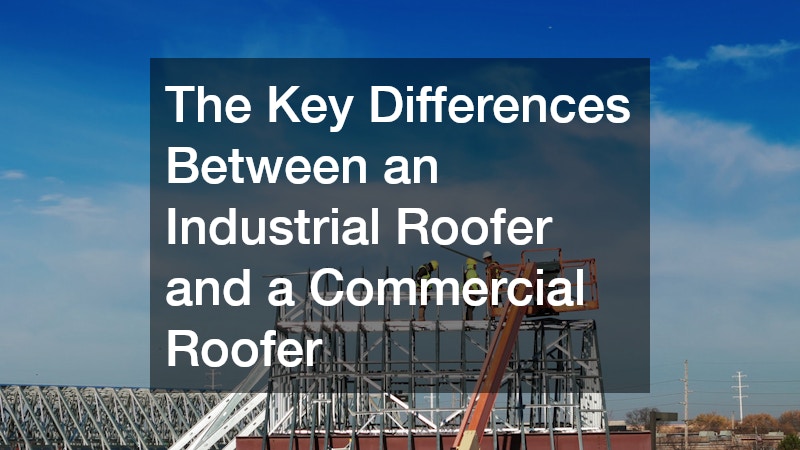The roofing industry is a crucial part of building infrastructure, encompassing both industrial and commercial sectors. Understanding the distinctions between an industrial roofer and a commercial roofer is essential for businesses and property owners seeking the right expertise for their roofing needs. This article delves into the fundamental differences, exploring common inquiries people have about these two types of roofing professionals.
The Main Responsibilities of an Industrial Roofer
Scope of Work in Industrial Roofing
Industrial roofers primarily focus on large-scale projects, dealing with facilities such as factories, warehouses, and power plants. Their responsibilities often involve installing, maintaining, and repairing massive roofing systems that cover extensive areas. These projects typically require coordinated efforts across different teams to handle the complex logistical challenges presented by industrial settings.
Additionally, industrial roofers must ensure that the roofing they install can handle the unique operational demands of industrial facilities. This includes managing elements like heavy equipment, ventilation systems, and environmental control systems within the structure. Given the scale and complexity, safety protocols and standards play a significant role in how industrial roofers execute their tasks.
Materials and Techniques Used
Industrial roofers often use highly durable materials, such as thermoplastic polyolefin (TPO), ethylene propylene diene monomer (EPDM), and metal roofing, to withstand the operational rigor of industrial environments. These materials are chosen for their longevity, resistance to harsh weather conditions, and low maintenance requirements. Moreover, the installation techniques are often sophisticated, requiring specialized training and equipment.
Strict compliance with industry regulations and standards is critical for industrial roofing, ensuring safety and operational efficiency. Industrial roofers frequently attend training to stay updated on the latest safety protocols and material innovations, ensuring compliance with Occupational Safety and Health Administration (OSHA) regulations and other relevant standards. Such compliance is not only legally mandated but also important for the safety and reliability of industrial operations.
How a Commercial Roofer Differs from an Industrial Roofer
Common Projects for Commercial Roofers
Commercial roofers handle a wide array of projects, from office buildings and retail shops to schools and healthcare facilities. These projects typically involve roofs that are smaller in scale compared to industrial roofs, but often require a high degree of customization. The variety in building designs and requirements means commercial roofers must be adaptable and creative in their approach.
Commercial roofers frequently work with different roofing types like asphalt shingles, modified bitumen, and single-ply systems to meet various aesthetic and functional needs. The choice of materials often depends on factors such as the budget, environmental conditions, and client preferences. The ability to tailor solutions to such diverse needs is a hallmark of commercial roofing expertise.
Expertise and Skill Sets
The expertise of commercial roofers extends to being proficient in dealing with different types of business establishments and architectural designs. Unlike industrial roofers, commercial roofing professionals need to have skills that allow for rapid adaptability given the smaller, more varied project scales. This often involves problem-solving on the fly and customizing solutions to fit specific business operational needs.
Commercial roofers must be knowledgeable about local building codes and regulations to ensure compliance. This often involves navigating zoning laws and other local governmental considerations that can vary significantly from one region to another. By understanding and adhering to these codes, commercial roofers help protect their clients from future legal complications and cost overruns.
When to Hire an Industrial vs. Commercial Roofer
Factors Influencing Your Decision
The choice between hiring an industrial or commercial roofer largely depends on the project scale, building function, and specific industry needs. Industrial roofing is typically reserved for projects demanding robust systems capable of supporting heavy machinery and stringent safety standards. In contrast, commercial roofing is more suited to retail, office spaces, and institutional buildings where design and versatility are prioritized.
For large facilities with intense operational demands, an industrial roofer is likely the best choice, as they offer expertise in handling complex requirements and regulatory compliance. The necessity for durability and the ability to accommodate specific operational equipment dictate the choice of specific roofing systems and methods. On the other hand, smaller projects focused on aesthetics and practicality, such as retail or office buildings, may benefit more from a commercial roofer’s skills.
Assessing Project Requirements
Understanding the specific demands of your project is essential in choosing the right type of roofing professional. Start by evaluating aspects such as the project’s complexity, the function of the building, and environmental considerations. These elements are critical in determining which expertise – industrial or commercial roofing – will best meet your needs.
Analyzing your project’s budgetary constraints and timeline is also crucial. Industrial projects often require significant investment upfront due to the scale and material costs, whereas commercial projects might allow for more flexibility in budgeting and timelines. Well-defined requirements and goals will help in selecting a roofing professional with the expertise and skills necessary to deliver your project on time and within budget.
The distinction between industrial and commercial roofers is significant, impacting project outcomes and budget considerations. Understanding their roles, project scopes, and expertise helps property owners make informed decisions, ensuring that their roofing investments are sound and aligned with their specific needs. By choosing the right roofing professional, businesses and property owners can achieve a balance between functionality, durability, and aesthetics, ultimately enhancing the long-term value of their buildings.




